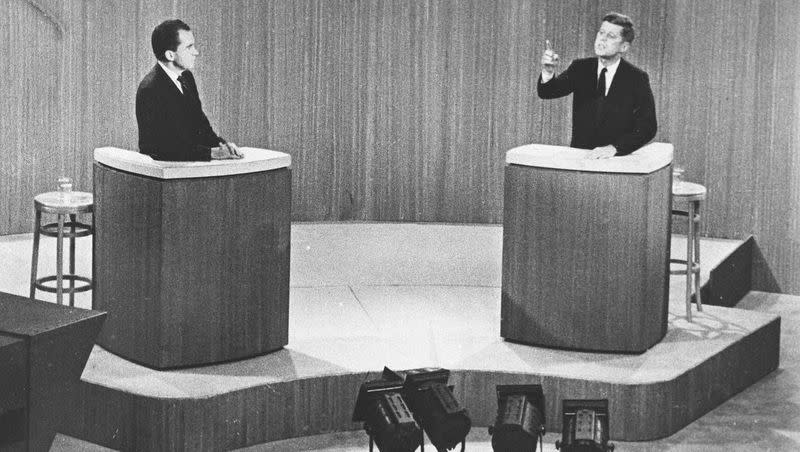The first televised presidential debate happened 63 years ago today. Here’s why that matters

- Oops!Something went wrong.Please try again later.
- Oops!Something went wrong.Please try again later.
About 85 to 120 million people turned on their televisions at home or went to public places to watch as the first televised presidential debate aired 63 years ago, today.
Not only did the televised debate make history for being the first of its kind but, “pollsters estimated that approximately 2.4 million voters determined their choice of party solely on the basis of the ‘Great Debates,’” according to the Library of Congress.
Related
Today in history: On Sept. 26, 1960, Sen. John F. Kennedy and Vice President Richard Nixon went live on national television, “for a discussion of issues in the current political campaign by the two major candidates for the presidency,” according to the opening remarks from the moderator of this historic debate, Howard K. Smith.
The first debate was reportedly facilitated in a Chicago studio and was the first of four total debates prior to the 1960 election.
The JFK Library reported that the presidential race of 1960 was “very tight” and that this opportunity for the public “to meet” the candidates via national television was never before available until Kennedy and Nixon agreed to discuss their political stances live on air.
It was further reported that both candidates were “skilled debaters” and that this decision may have been a factor that helped win over voters to give Kennedy the 1960 win.
Related
Why this matters? History reported that, “Kennedy emerged the apparent winner from this first of four televised debates, partly owing to his greater ease before the camera than Nixon, who, unlike Kennedy, seemed nervous and declined to wear makeup.”
The impact of television showed in the election results as, “people who listened to the radio were more likely to vote for Nixon while people who watched the debates on television were more likely to vote for Kennedy,” according to Purdue University’s academic analysis of the debate.
Less than three weeks following the televised debate Kennedy reportedly won, “49.7 % of the popular vote in one of the closest presidential elections in U.S. history, surpassing by a fraction the 49.6% received by his Republican opponent.”
The JFK Library reported that “before the first debate, a Gallup poll showed Nixon only slightly ahead 47% to 46%. In a Gallup poll taken after the fourth and final debate, Kennedy had edged out Nixon 49% to 46%.”
Following the four debates Nixon and Kennedy participated in, a survey taken reportedly showed that of, “an estimated four million voters who were undecided before the debates, three million became JFK supporters.”
The Library of Congress reported that, “The milestone events thrust broadcast media into a central role in American political life. The trend continues despite critics blaming the media for ‘merchandising’ of candidates, the rising cost of political campaigns, and the use of advertising agencies in the ‘image manipulation’ of candidates.”
Related
How did the Kennedy-Nixon debate change politics? The National Constitution Center reported that “their first televised debated shifted how presidential campaigns were conducted, as the power of television took elections into American’s living rooms.”
While candidates had reportedly made televised appearances or debated with written news coverage to detail their correspondence, “most voters never had a chance to see candidates in a close, personal way, giving them the opportunity to form an opinion about the next president based on their looks, their voice and their opinions.”
This opportunity to see political candidates live and in person has become a recent topic in public discourse as the country is heading into the 2024 presidential election.
As sitting President Joe Biden’s health and age have come into question for current voters, Kennedy’s nephew Robert F. Kennedy Jr. has urged the importance of holding debates as he is now running for the presidency, according to Fox News.
“It’s important for the American people to know that their president has the vigor to handle this very rigorous job and I think there are enough doubts about that now that President Biden really needs to come out and have an unscripted meetings and interactions with voters, that he needs to do some town halls and retail politics and hopefully a debate so that the American people can make a choice about whether or not the president is up to the job,” Kennedy said.

